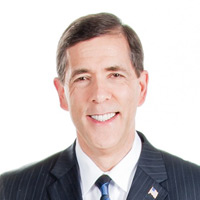The Challenge of Financing Health Care in Retirement
Invest in your health as you would in your 401(k): Do it automatically and stick with a plan.

Profit and prosper with the best of Kiplinger's advice on investing, taxes, retirement, personal finance and much more. Delivered daily. Enter your email in the box and click Sign Me Up.
You are now subscribed
Your newsletter sign-up was successful
Want to add more newsletters?

Delivered daily
Kiplinger Today
Profit and prosper with the best of Kiplinger's advice on investing, taxes, retirement, personal finance and much more delivered daily. Smart money moves start here.

Sent five days a week
Kiplinger A Step Ahead
Get practical help to make better financial decisions in your everyday life, from spending to savings on top deals.

Delivered daily
Kiplinger Closing Bell
Get today's biggest financial and investing headlines delivered to your inbox every day the U.S. stock market is open.

Sent twice a week
Kiplinger Adviser Intel
Financial pros across the country share best practices and fresh tactics to preserve and grow your wealth.

Delivered weekly
Kiplinger Tax Tips
Trim your federal and state tax bills with practical tax-planning and tax-cutting strategies.

Sent twice a week
Kiplinger Retirement Tips
Your twice-a-week guide to planning and enjoying a financially secure and richly rewarding retirement

Sent bimonthly.
Kiplinger Adviser Angle
Insights for advisers, wealth managers and other financial professionals.

Sent twice a week
Kiplinger Investing Weekly
Your twice-a-week roundup of promising stocks, funds, companies and industries you should consider, ones you should avoid, and why.

Sent weekly for six weeks
Kiplinger Invest for Retirement
Your step-by-step six-part series on how to invest for retirement, from devising a successful strategy to exactly which investments to choose.
Many people ignore the impact health care costs will have on their nest eggs as they age. In fact, only 12% of working Americans have taken any steps toward addressing medical expenses in retirement, according to a study cited in HealthView Services' 2016 Retirement Health Care Costs Data Report.
There's a reason for people's lack of concern. Most have gotten used to having an employer pick up some percentage of the cost of their medical insurance premiums; it's been a company benefit they've counted on forever. They have no idea what the burden will be when they're left to foot the premiums on their own, perhaps because they chose to retire early or because they were a victim of downsizing.
And the result is some serious sticker shock.
From just $107.88 $24.99 for Kiplinger Personal Finance
Become a smarter, better informed investor. Subscribe from just $107.88 $24.99, plus get up to 4 Special Issues

Sign up for Kiplinger’s Free Newsletters
Profit and prosper with the best of expert advice on investing, taxes, retirement, personal finance and more - straight to your e-mail.
Profit and prosper with the best of expert advice - straight to your e-mail.
Take, for example, a married couple in their late 50s or early 60s, who because of their age have health issues that make it necessary to choose a more comprehensive—and, therefore, more expensive—health insurance plan.
It's probably going to cost them about $18,000 a year—an expense they didn't plan for and isn't in their budget.
Think Medicare will save them when they reach 65? Think again. According to that same 2016 report, the total projected health care premiums (Parts B, D and supplemental insurance) for a healthy 65-year-old couple retiring this year are expected to be $288,400 (in today's dollars) over their lifetime. Factor in the out-of-pocket expenses such as deductibles, copays, hearing, vision and dental, and the cost goes up to $377,412. For someone who is now 55, that cost will be closer to a half-million dollars.
So the conversation becomes, "By the way, Mr. and Mrs. Client, do you happen to have $400,000 or $500,000 lying around that you can use to take care of these costs?" In a lot of cases, they haven't even saved $500,000!
What can they do about it? Well, for one thing, they can take better care of themselves. The last thing you want, after you've worked hard all your life to accumulate savings, is to have your health be a hindrance on your ability to enjoy your retirement.
People invest systematically toward their future finances—they consult with a financial professional and put money away every paycheck. Think about it: The automatic investments into a 401(k) happen no matter what, and these deposits slowly compound over time into a large sum of money. This is called the compound effect.
The same strategy works for investing in your health: You should automatically take your vitamins and commit to an exercise plan. Of course you won't see results right away, but the compound effect of these good habits will have a profound impact on your health in retirement. The problem is a lot of people ignore investing in their wellness, and it slowly compounds in a negative way.
Of course, medical costs will come up for even the healthiest of people and need to be planned for, including those dreaded long-term care costs. Very few people are planning for that—maybe one out of four—which means most people will cover those expenses themselves when the time comes. And that money will come dollar for dollar out their portfolio.
Even those who purchased a long-term care insurance plan while they were young are at risk of eventually being priced out, because the premiums are going up so quickly.
So again, it comes down to creating a plan. There are alternatives to LTC insurance, such as long-term care savings accounts. There are insurance policies that can provide additional cash flow in the event of a long-term care situation. And if you don't qualify for life insurance, there are annuities with optional riders, generally associated with an additional cost, that can help you offset the costs of long-term care expenses.
It's an area of financial planning that a lot of professionals gloss over while they focus on investments or converting your 401(k) to a Roth IRA.
But the hole at the bottom of the bucket for most retirees is this health care issue.
That means working on your weight, cholesterol, blood pressure, etc., as well as your retirement plan, at the same time.
Richard W. Paul is the president of Richard W. Paul & Associates, LLC, and the author of "The Baby Boomers' Retirement Survival Guide: How to Navigate Through the Turbulent Times Ahead." He is an Investment Adviser Representative and insurance professional.
Kim Franke-Folstad contributed to this article.
Profit and prosper with the best of Kiplinger's advice on investing, taxes, retirement, personal finance and much more. Delivered daily. Enter your email in the box and click Sign Me Up.

Richard W. Paul is the president of Richard W. Paul & Associates, LLC, and the author of "The Baby Boomers' Retirement Survival Guide: How to Navigate Through the Turbulent Times Ahead." He holds life and health insurance licenses in Michigan and Florida and is a Certified Financial Planner, Registered Financial Consultant, Investment Adviser Representative and insurance professional.
-
 Nasdaq Leads a Rocky Risk-On Rally: Stock Market Today
Nasdaq Leads a Rocky Risk-On Rally: Stock Market TodayAnother worrying bout of late-session weakness couldn't take down the main equity indexes on Wednesday.
-
 Quiz: Do You Know How to Avoid the "Medigap Trap?"
Quiz: Do You Know How to Avoid the "Medigap Trap?"Quiz Test your basic knowledge of the "Medigap Trap" in our quick quiz.
-
 5 Top Tax-Efficient Mutual Funds for Smarter Investing
5 Top Tax-Efficient Mutual Funds for Smarter InvestingMutual funds are many things, but "tax-friendly" usually isn't one of them. These are the exceptions.
-
 Social Security Break-Even Math Is Helpful, But Don't Let It Dictate When You'll File
Social Security Break-Even Math Is Helpful, But Don't Let It Dictate When You'll FileYour Social Security break-even age tells you how long you'd need to live for delaying to pay off, but shouldn't be the sole basis for deciding when to claim.
-
 One of the Most Powerful Wealth-Building Moves a Woman Can Make: A Midcareer Pivot
One of the Most Powerful Wealth-Building Moves a Woman Can Make: A Midcareer PivotIf it feels like you can't sustain what you're doing for the next 20 years, it's time for an honest look at what's draining you and what energizes you.
-
 I'm a Wealth Adviser Obsessed With Mahjong: Here Are 8 Ways It Can Teach Us How to Manage Our Money
I'm a Wealth Adviser Obsessed With Mahjong: Here Are 8 Ways It Can Teach Us How to Manage Our MoneyThis increasingly popular Chinese game can teach us not only how to help manage our money but also how important it is to connect with other people.
-
 Looking for a Financial Book That Won't Put Your Young Adult to Sleep? This One Makes 'Cents'
Looking for a Financial Book That Won't Put Your Young Adult to Sleep? This One Makes 'Cents'"Wealth Your Way" by Cosmo DeStefano offers a highly accessible guide for young adults and their parents on building wealth through simple, consistent habits.
-
 Global Uncertainty Has Investors Running Scared: This Is How Advisers Can Reassure Them
Global Uncertainty Has Investors Running Scared: This Is How Advisers Can Reassure ThemHow can advisers reassure clients nervous about their plans in an increasingly complex and rapidly changing world? This conversational framework provides the key.
-
 Should You Jump on the Roth Conversion Bandwagon? A Financial Adviser Weighs In
Should You Jump on the Roth Conversion Bandwagon? A Financial Adviser Weighs InRoth conversions are all the rage, but what works well for one household can cause financial strain for another. This is what you should consider before moving ahead.
-
 The 8 Stages of Retirement: An Expert Guide to Confidence, Flexibility and Fulfillment, From a Financial Planner
The 8 Stages of Retirement: An Expert Guide to Confidence, Flexibility and Fulfillment, From a Financial PlannerRetirement planning is less about hitting a "magic number" and more about an intentional journey — from understanding your relationship with money to preparing for your final legacy.
-
 5 Mistakes to Avoid in the 5 Years Before You Retire, From a Financial Planner
5 Mistakes to Avoid in the 5 Years Before You Retire, From a Financial PlannerWhen retirement is in reach, financial planning gets serious — and there's a heightened risk of making serious mistakes, too. Here are five common slipups.